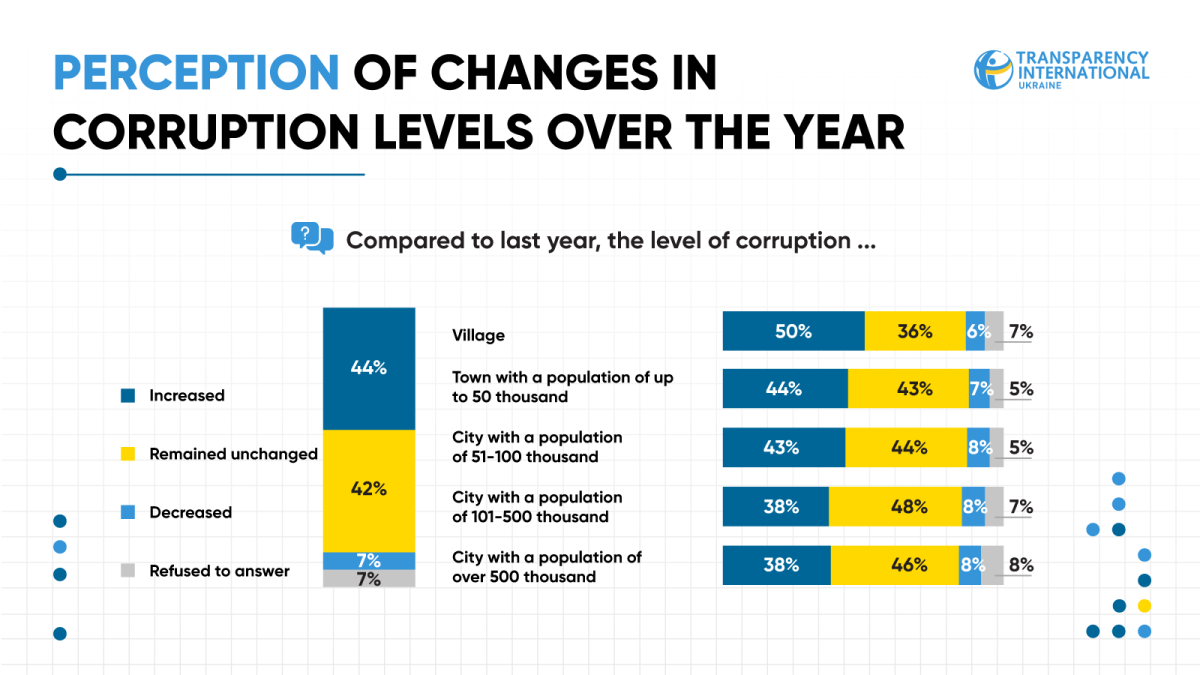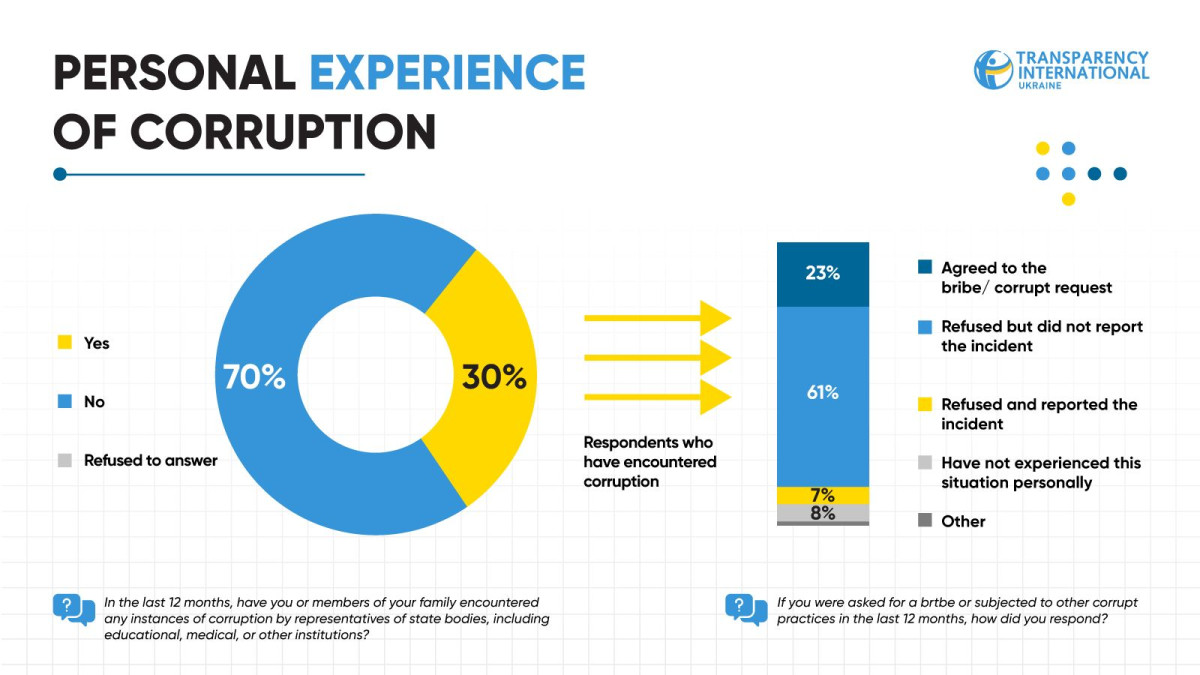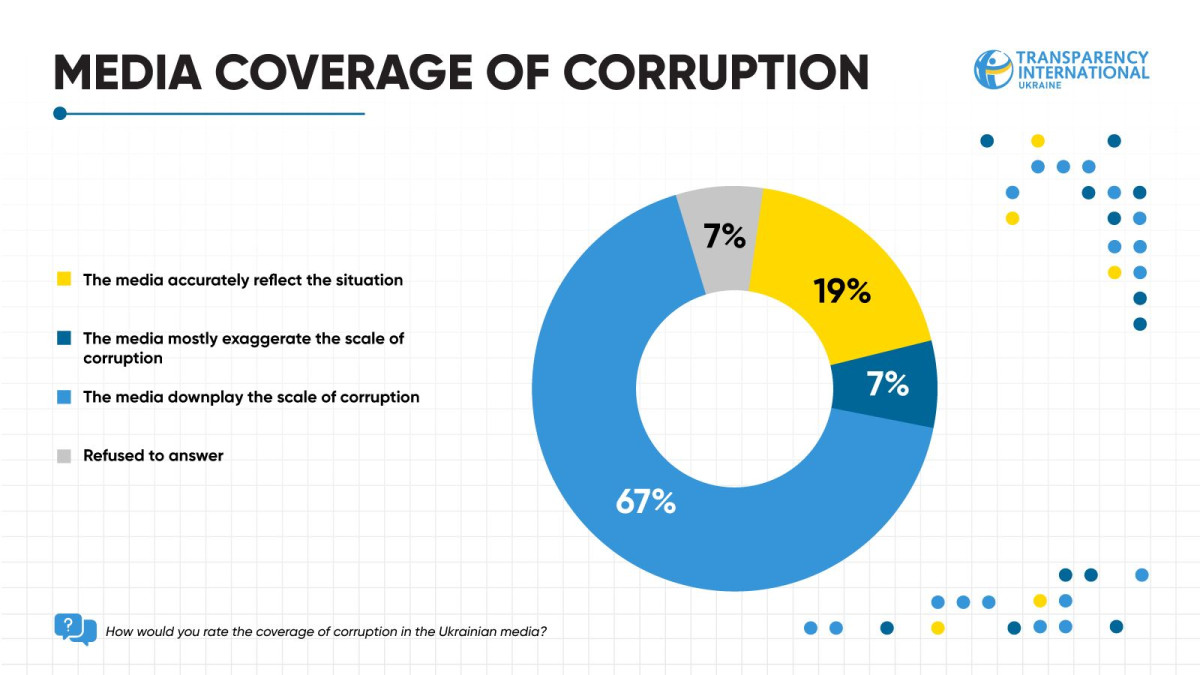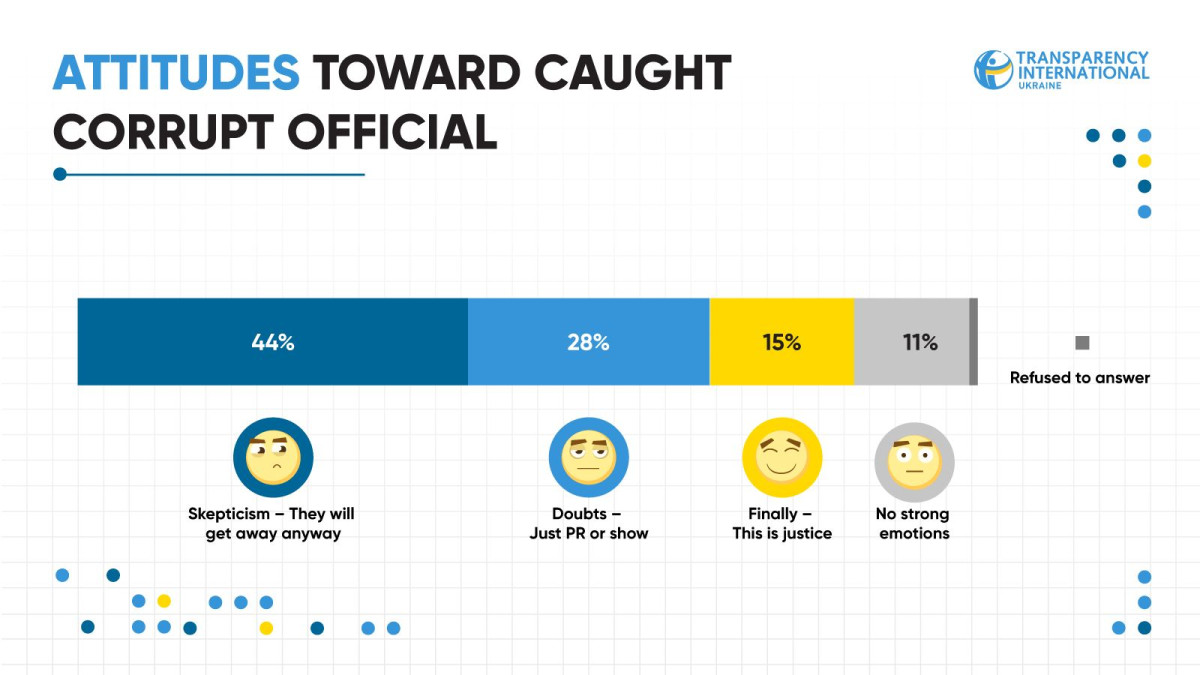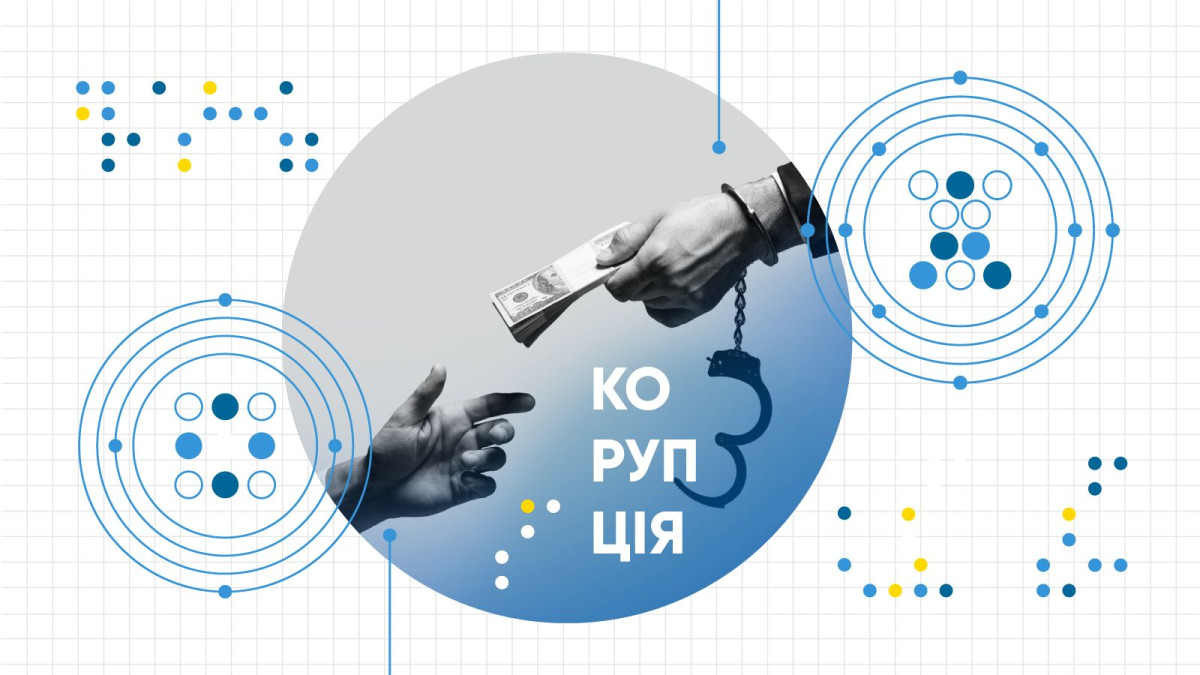

Despite the high level of perceptions of corruption as a problem among Ukrainians, only 30% of citizens reported that they or members of their families personally encountered corrupt practices over the past year. Of these, only 23% agreed to engage in the proposed corrupt exchange, while 68% refused.
These findings were presented by Transparency International Ukraine in the third wave of a sociological survey. This constitutes the second part of a large-scale public opinion study conducted by the research agency Info Sapiens commissioned by Transparency International Ukraine, focusing on corruption, reconstruction, and European integration.
The survey underscored the relevance of the corruption issue, as the vast majority of Ukrainians perceive corruption as a widespread phenomenon — 87% of respondents. Although this perception is shared across all age cohorts, older individuals (65+) expressed the most critical assessments, with 90% identifying corruption as widespread. By contrast, among youth under 24, the share was somewhat lower — 81%.
The survey underscored the relevance of the corruption issue, as the vast majority of Ukrainians perceive corruption as a widespread phenomenon — 87% of respondents.
As in 2023, the main challenges for Ukrainians today remain Russia’s armed aggression against Ukraine, corruption, and the destruction of infrastructure. Compared to data from two years ago, however, the salience of corruption as a problem has slightly declined — 81% now versus 88% in November 2023.
Assessments of corruption dynamics are divided: 44% of respondents believe that its level has increased, 42% consider it unchanged, and only 7% are convinced that it has decreased compared to the previous year. Reports of rising corruption were more common among rural residents (50%), while in medium-sized and large cities this proportion was lower.
A total of 89% of respondents consider political corruption to be a particularly serious problem, 81% identify business corruption as serious, and only 63% perceive petty or everyday corruption as very or somewhat serious.
At the same time, more than half of Ukrainians (51%) consider the authorities inactive in addressing corruption, and nearly three-quarters (73%) believe that it can only be overcome through systemic reforms. Notably, only 29% positively evaluate the work of anti-corruption institutions, while 38% disagree with such an assessment. Almost half of respondents (48%) regard Prozorro as an effective instrument for reducing corruption, while 27% do not share this view.
A pervasive belief in the inevitability of bribes persists: 55% agree that “nothing can be achieved without them,” and overall, respondents are more likely to reject the notion that issues in public institutions can be resolved without resorting to bribery.
More than half of Ukrainians (51%) consider the authorities inactive in addressing corruption, and nearly three-quarters (73%) believe that it can only be overcome through systemic reforms.
Personal experience and attitudes toward corruption
Despite high levels of perceived corruption overall, only 30% of Ukrainians reported that they or their family members personally encountered corrupt practices during the past year. Among these, about a quarter complied with a corrupt demand, while 7% reported experiencing an attempted bribe solicitation.
Attitudes toward corrupt practices remain ambivalent: nearly half of Ukrainians are convinced that bribery can never be justified, while 23% report that they would always or in most cases justify corruption. Those who tolerate “petty corruption” most frequently justify bribes in exchange for better services in state-run medical institutions (53%) or educational institutions (35%). Remarkably, only 15% of those who tolerate corruption admitted the possibility of offering a bribe to avoid mobilization.
“Corruption remains one of the key societal problems; at the same time, Ukrainians do not believe in the real effectiveness of anti-corruption efforts. This creates a serious gap: the public demand for justice is growing, but emotionally, people feel disappointed and skeptical. Ukrainians know little about the achievements already made, so the absence of information is often perceived as a lack of progress. It is important not only to counteract corrupt practices but also to communicate the results of this struggle effectively,” noted Anastasiia Mazurok, Chief Operating Officer of Transparency International Ukraine.
Corruption remains one of the key societal problems; at the same time, Ukrainians do not believe in the real effectiveness of anti-corruption efforts. This creates a serious gap: the public demand for justice is growing, but emotionally, people feel disappointed and skeptical.
Anastasiia Mazurok
Media coverage of corruption
Two-thirds (67%) of respondents believe that the media significantly downplay the scale of corruption in Ukraine. Twenty percent consider media coverage accurate, and only 7% think the extent of corruption is exaggerated in the Ukrainian press.
Most often, citizens report encountering media coverage of searches, suspicions, and detentions. Forty-one percent mentioned reports of criminal proceedings being opened, while only one in five recalled coverage of court verdicts or legislative changes. Just 13% reported seeing media materials on reforms, which are considered the key to overcoming corruption.
Overall, 72% of Ukrainians are skeptical of news about apprehended officials accused of corruption. Most respondents assume such reports reflect mere PR efforts by law enforcement agencies or that suspects will ultimately “buy their way out.” Only 15% of respondents expressed satisfaction with the delivery of justice upon reading such news.
Importantly, more than half of respondents (60%) consider the most significant indicator of effective anti-corruption efforts to be the number of officials actually punished, including imprisonment or asset confiscation. However, only 30% of Ukrainians reported hearing about cases of punished officials over the past year, and these respondents were more likely to believe in progress in combating corruption and in institutional effectiveness.
“Our research shows that systemic changes must now be implemented with double effort, through measures that would demonstrate real progress toward a corruption-free society. During wartime, any corruption observed by citizens is amplified at the level of perception. Thus, corrupt practices will only become more visible, and public reactions — more intense. As a result, social cohesion decreases and public emotions intensify. The demand for systemic reforms has been clearly articulated, and Ukrainians expect them,” commented Andrii Borovyk, Executive Director of Transparency International Ukraine.
The survey was conducted by the research agency Info Sapiens on behalf of Transparency International Ukraine in June–July 2025. The sample included 1,015 respondents, representative by gender, age, settlement type and size, and macro-region across government-controlled territories of Ukraine. Data collection method: telephone interviews (CATI).
This is already the third wave of the survey: Transparency International Ukraine previously presented results in June and December 2023.
This publication was prepared by Transparency International Ukraine with the financial support of Sweden.
During wartime, any corruption observed by citizens is amplified at the level of perception. Thus, corrupt practices will only become more visible, and public reactions — more intense. As a result, social cohesion decreases and public emotions intensify. The demand for systemic reforms has been clearly articulated, and Ukrainians expect them.
Andrii Borovyk




